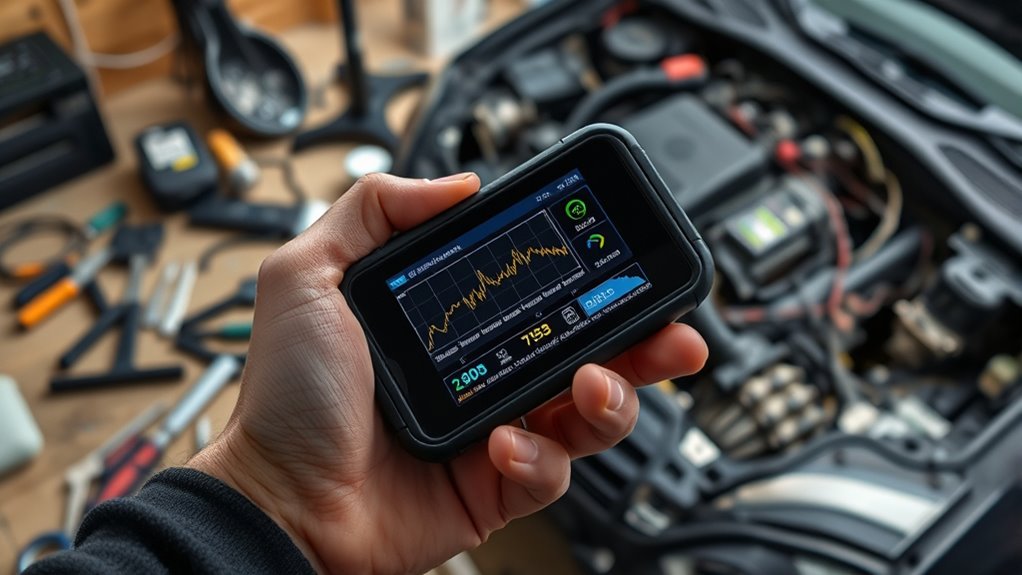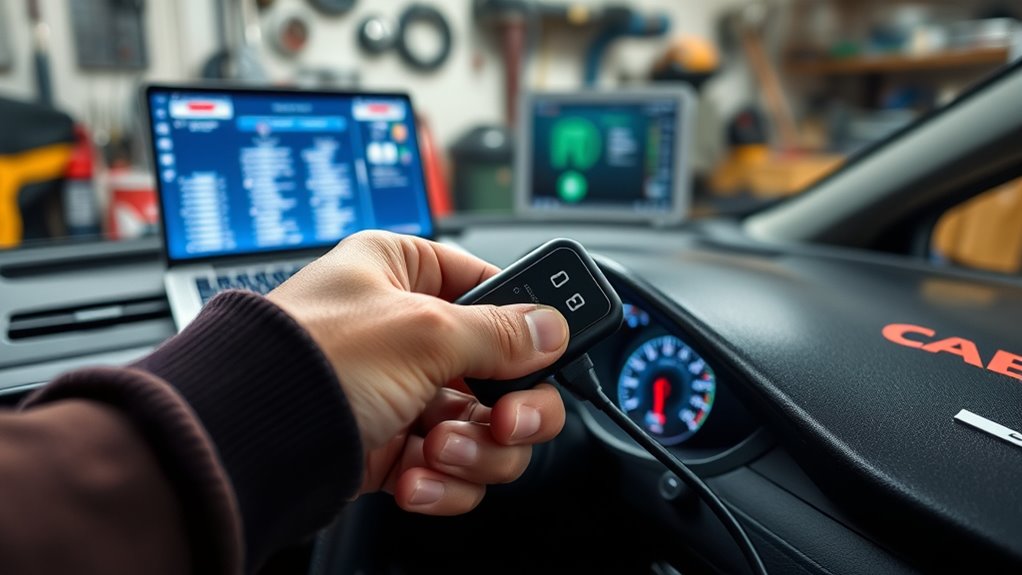DIY diagnostic tools can be helpful for basic vehicle checks, but their reliability varies based on quality, compatibility, and your ability to interpret data. Low-cost scanners might only catch simple engine codes, while higher-end options provide more detailed information similar to professional systems. However, even the best tools have limitations and may miss complex issues. To get a clear picture and avoid costly mistakes, it’s important to understand their capabilities—you’ll find more insights if you keep exploring.
Key Takeaways
- The accuracy of DIY diagnostic tools varies widely depending on quality and sophistication.
- Higher-end tools tend to provide more reliable and detailed vehicle data than basic, budget options.
- Compatibility issues and user interpretation skills can affect the dependability of readings.
- DIY tools are useful for routine checks but may miss complex problems requiring professional diagnostics.
- For critical or complex vehicle issues, consulting a professional mechanic ensures accurate diagnosis and safe repairs.

Have you ever wondered if you can troubleshoot technical issues yourself without waiting for professionals? With the rise of DIY diagnostic tools, many car owners are considering whether they can handle car repair tasks on their own. These tools, often affordable and easy to use, promise to give you insights into your vehicle’s health without the need for a mechanic. But the key question remains: how reliable are these DIY diagnostic tools? When you’re relying on them, tool accuracy becomes a critical factor that can determine whether you successfully identify the problem or end up misdiagnosing a crucial issue.
In the domain of car repair, DIY diagnostic tools have made it more accessible than ever to check engine codes, monitor sensor data, and even track real-time performance. Instead of relying solely on a mechanic’s interpretation, you can plug in a scanner or use a smartphone app to get instant feedback. However, the accuracy of these tools can vary considerably. Some low-cost scanners may only read basic codes, missing deeper or more complex issues that could lead to costly repairs if left unresolved. High-end diagnostic tools tend to offer better tool accuracy, providing detailed data that aligns closely with professional-grade equipment. Still, even the most advanced DIY tools might not match the precision of factory diagnostic systems used in professional auto repair shops.
DIY car diagnostic tools vary in accuracy; high-end models provide professional-level data, while budget options may miss complex issues.
When you’re considering a diagnostic tool, it’s essential to understand that tool accuracy depends on multiple factors. First, the quality of the hardware and software plays an essential role. Cheaper devices may give you surface-level information, which could be enough for minor repairs but insufficient for complex problems. Second, the compatibility of the tool with your specific vehicle model also impacts dependability. Some tools are more effective with certain brands or models, offering more precise readings and fewer false alarms. Lastly, your own knowledge and ability to interpret the data matter. Even the most accurate tool can lead to mistakes if you don’t understand what the readings mean, which could result in unnecessary repairs or overlooking a critical issue. Additionally, the contrast ratio of a diagnostic screen can influence how easily you interpret detailed graphs and data outputs, affecting your assessment accuracy.
While DIY diagnostic tools have come a long way, they aren’t a complete substitute for professional diagnostics, especially for complex car repair issues. They’re excellent for preliminary checks and routine maintenance, but their dependability hinges on tool accuracy and your understanding of the data. Keep in mind that no tool is perfect, and when in doubt, consulting a professional mechanic can save you time and money in the long run. Nonetheless, these tools empower you to take control of basic diagnostics, provided you choose high-quality options and stay informed about their limitations.
Frequently Asked Questions
Can DIY Diagnostic Tools Detect All Vehicle Issues?
DIY diagnostic tools can’t detect all vehicle issues because of sensor limitations and software compatibility. You might identify common problems like engine or transmission codes, but complex issues often require professional equipment. These tools are great for basic troubleshooting, yet they fall short on advanced diagnostics. If you want a thorough check, it’s best to consult a mechanic who has access to specialized tools and updated software.
How Often Should I Calibrate My DIY Diagnostic Device?
You should calibrate your DIY diagnostic device regularly, like clockwork, to keep it in top shape. Follow the manufacturer’s maintenance schedule, typically every 3 to 6 months or after any major repairs. Keeping up with calibration guarantees accurate readings and reliable diagnostics. Don’t wait until things go awry—staying proactive with your maintenance schedule helps prevent costly mistakes and keeps your tool running smoothly.
Are DIY Tools Compatible With All Car Makes and Models?
DIY diagnostic tools aren’t compatible with all car makes and models due to compatibility concerns and manufacturer restrictions. Before using your device, check its specifications and supported vehicles. Some tools work well with certain brands, but may not connect properly or read data accurately on others. Always verify compatibility to avoid issues, and consider manufacturer restrictions that might limit the tool’s functionality with specific car models.
What Are the Common Errors When Using DIY Diagnostic Kits?
Common errors when using DIY diagnostic kits include user error and misinterpretation of results. You might connect the device incorrectly, skip reading the manual, or misunderstand error codes, leading to false diagnoses. Always double-check connections, thoroughly read instructions, and consult reliable resources to interpret codes accurately. Avoid rushing through the process; taking your time helps prevent mistakes that could mislead you about your vehicle’s condition.
Do DIY Diagnostic Tools Provide Accurate Emissions Testing Results?
You might wonder if DIY diagnostic tools can truly deliver accurate emissions testing results. They can be quite reliable, but calibration accuracy is vital—if your device isn’t properly calibrated, emission reliability drops dramatically. While some tools provide decent insights, the precision often isn’t on par with professional testing. For the best results and peace of mind, consider professional emissions testing, especially if your DIY readings raise concerns.
Conclusion
While DIY diagnostic tools might seem like your personal crystal ball, they’re not always foolproof. Think of them as a map with missing landmarks—helpful but not perfect. Relying solely on them can lead you down a winding road of false alarms or missed signs. For peace of mind, trust your instincts but also swing open the door to professional help. After all, even the best tools need a skilled guide to truly navigate the road ahead.









